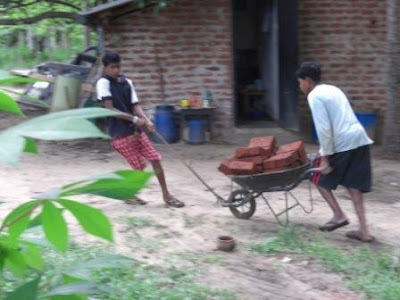
When one is used to taking a word as a bond, when promises are made and are not kept, it starts a chain reaction. As a result of someone for example letting me down, that creates a problem for me as inevitably I will have to let someone else down as my promise to the other person was made on the basis that the promise made to me will be kept.
One must realize that the person you break your promise to, does not care of the reasons for breaking it. Those reasons are not relevant to him. It therefore puts the promise maker in an altogether vulnerable situation being branded a liar.
This problem is acute in Sri Lanka, as most people cannot say no and even worse, cannot give notice when they leave their jobs, putting the person who is relying on that task in a very bad position. I guess larger organizations by definition are able to cope better with this situation, as they have more people who can take over tasks left undone by others, and in smaller organizations this is an acute problem.
In my personal case I have been put into so many situations in a short time span where promises were broken and I have accordingly not been able to keep my promises, putting me in very embarrassing situations, as well as in desperate financial straits due to other people’s behavior.
How one avoids the reduction of this sort of issue is either, almost assuming this promise will not be kept and making a plan B in every situation, or not making any promises to anyone, or at least tell them that your promise is purely contingent upon something else.
For example this year has been a disaster as far as the weather is concerned with more than the expected rains falling in all parts of the island. This has been a severe hindrance to the agricultural output as even farm work stops for rain and people are nevertheless paid.
So in this kalpanakaranna blog we need to think a little before we can promise, as promises create expectations that sometimes can be unrealistic. I am torn with being unable to accept a very high degree of uncertainty in my dealings with people, that has made my life extremely difficult.
One must realize that the person you break your promise to, does not care of the reasons for breaking it. Those reasons are not relevant to him. It therefore puts the promise maker in an altogether vulnerable situation being branded a liar.
This problem is acute in Sri Lanka, as most people cannot say no and even worse, cannot give notice when they leave their jobs, putting the person who is relying on that task in a very bad position. I guess larger organizations by definition are able to cope better with this situation, as they have more people who can take over tasks left undone by others, and in smaller organizations this is an acute problem.
In my personal case I have been put into so many situations in a short time span where promises were broken and I have accordingly not been able to keep my promises, putting me in very embarrassing situations, as well as in desperate financial straits due to other people’s behavior.
How one avoids the reduction of this sort of issue is either, almost assuming this promise will not be kept and making a plan B in every situation, or not making any promises to anyone, or at least tell them that your promise is purely contingent upon something else.
For example this year has been a disaster as far as the weather is concerned with more than the expected rains falling in all parts of the island. This has been a severe hindrance to the agricultural output as even farm work stops for rain and people are nevertheless paid.
So in this kalpanakaranna blog we need to think a little before we can promise, as promises create expectations that sometimes can be unrealistic. I am torn with being unable to accept a very high degree of uncertainty in my dealings with people, that has made my life extremely difficult.





